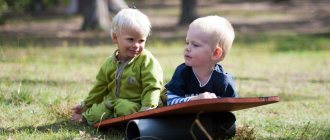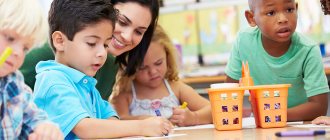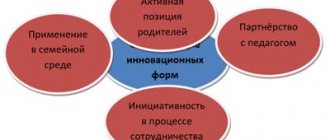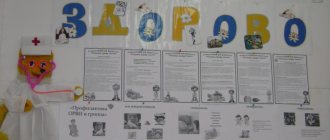Main directions of interaction between family and preschool institution
The family is the first educational institution that meets a child in modern society and accompanies him throughout his life. It is this first stage of personality development that lays the foundations of morality and reveals the inner world. And just at this time the child begins to come into contact with the public, and his first outing into society is, of course, kindergarten. And it is very important for us educators to establish interaction with the students’ parents. We have different methods and techniques, but we have the same goal, the harmonious development of the child. Interaction with family is a complex process, where the indicators of effectiveness are mutual understanding and mutual knowledge. In a modern preschool educational institution, work with parents is carried out in the following areas:
‒ Within the organization (informing parents about the work of the kindergarten, studying the characteristics of family education).
- Outside the garden (schools for future parents, lectures for parents).
To tell parents about the work of the kindergarten, open days, open events are organized, and stands are set up about life in the kindergarten. During open doors, tours of the garden or a round table with the participation of kindergarten specialists are held. Open events are organized to familiarize parents with direct educational activities. There is observation of interpersonal relationships in the group, familiarization with the living conditions of the group. You cannot ignore the use of Internet resources in the age of information technology, because modern parents are young and are active Internet users. Modern gardens create their own websites where they inform about their activities.
Work with parents takes place in the form of individual and collective work. Teamwork involves collaboration on issues that concern the majority of parents. Group and general meetings are suitable here. The topics of group meetings differ from general ones. At the first, there is a unification based on age, and the second includes issues of general development and mutual understanding. Individual ones are needed for a more thorough study of the family, these include conversations, consultations, etc.
Forms of work with families outside of kindergarten include thematic exhibitions and newsletters. Exhibitions are organized in the cultural center and cinema, where they summarize topics from the experience of family pedagogy and promote public preschool education. Information bulletins, with the consent of entrepreneurs, are placed in retail outlets, where they provide recommendations to customers:
- what toys are recommended at a certain age:
- what clothes are suitable for certain activities;
All of these activities are aimed at strengthening cooperation with parents, identifying common problems and establishing relationships for joint cooperation.
In our society, great attention is paid to the formation of comprehensive personal development. That is why it is very important to increase the effectiveness of all educational work. And first of all, the level of education in the family, where the child receives his first skills, as well as in preschool institutions, where the tasks of physical and mental, moral and aesthetic education of children are solved, taking into account age stages. Hence the need for interaction between parents and educators. Together we develop the child’s mind, character, and views; it depends on us how much his life will be filled with useful work and good deeds.
To ensure that work with parents is varied, different forms of organization are used:
- conversations;
‒ consultations on certain topics;
- general parent meetings;
- group parent meetings;
- question and answer evenings;
- conferences (the most important tasks of which are to summarize the best experience in family education).
Most parents trust the advice of the teacher, but there are also those who are reluctant to make contact. It is especially difficult to convince some of them of the need to instill independence in their children. Parents cannot come to terms with the idea that at one year old the child is already able to do some things on his own. In a conversation with parents, they talked about how timely developed skills have a positive effect on the development of children.
Also, when observing the behavior of children in a group, we give parents more specific advice on how to agree on uniform requirements for the child, etc. Thus, we find out whether all opportunities are being made in the family for the normal upbringing of the child, what kind of help parents need.
When conducting a conversation, we maintain restraint and tact, and use forms of address such as: “Let’s think together about how best to proceed”; “We can do this, what do you think?”, What will you do?
We also try to choose a convenient time for conversation, so that parents are not in a hurry and then we can talk in detail about what worries parents.
We tell parents about the good deeds of their children, and note what skills they need to instill in them. Not everything can be discussed in front of a child. For example, questions in his absence: Does he listen, is he capricious?; Are you accustomed to order? How does he behave with his peers? What is the approach to him from adults, which one is most pliable, what tone has a favorable effect on him: soft or strict?
If parents see interest in their child, then they willingly talk about their children. They appreciate it when you listen to their opinion; this is the best way to gain parents’ trust in the teacher.
Our consultations for parents are lively and interesting, supported by examples from the life of the group. Parents accept our advice with confidence, are interested, and share their doubts. We simply and clearly construct a difficult conversation with them.
When holding meetings, we do not rush to give answers to all the questions of mothers and fathers, but invite more experienced parents, those who have something to learn from, to speak. And a substantive, instructive conversation takes place, enriching those present with valuable experience. We also use a survey method in our work, which helps to get to know the family better and develop appropriate recommendations.
We often organize general consultations for parents, depending on the topic of the consultation, we agree which parent must attend it. When preparing them, we use the following topics: “Children’s household responsibilities”, “Books in a child’s home”, “Children’s whims and stubbornness, their reasons”, “Development of correct speech in a child”.
We select the necessary literature for such consultations and organize exhibitions of manuals, toys, and equipment.
There are also dysfunctional families. We begin conversations in the family by talking about the child’s positive qualities, we also note shortcomings, indicate their reasons, give recommendations, and make suggestions. We try to convince parents that the child learns what he sees at home. Many fathers and mothers react to our conversations, drawing the necessary conclusions for themselves.
Work with parents is carried out systematically and planned, collectively and individually. Cleanup days are organized as needed. Parents are systematically involved in active participation in the life of the group. Materials in the “Parent’s Corner” are compiled as needed and are systematically replaced.
It is difficult to work with the parents in question. Some of them are wary, cunning, and avoid meetings. But we try to convince them that we sincerely want to help them raise their children.
Literature:
- Azarov Yu. P. Family pedagogy. - M.: - 1993.
- Aliksashina I. Yu. Interrelation of psychological-pedagogical and subject-methodological knowledge as a condition for the development of a teacher’s professional needs in psychological-pedagogical knowledge. - M.: Publishing house of the Academy of Pedagogical Sciences of the USSR. — 1989.
- Blonsky P.P. Age-related characteristics of children// Fif. Ped. op. - M.: Publishing house of the Academy of Sciences of the RSFSR, 1969.
- Bozhovich L. I. Personality and its formation in childhood. - M.: Education, 1968.
- Bronzova I. L. Use of psychological knowledge in organizing criteria for assessing pedagogical situations // Professional needs of teachers in psychological and pedagogical knowledge. - M.: Publishing house. APN USSR, 1989.
- Vedenov A.V. Education of the will of a child in the family. - M.: Uchpedgiz., 1953.
Interaction with families of pupils. Work plan for the 2019-2020 academic year; methodological development
INTERACTION WITH FAMILIES OF PUPILS.
Work plan for the 2019-20120 academic year
Working with parents is based on mutual understanding and trust. A plan for working with parents is drawn up for a year.
Forms of interaction with parents
Depending on the tasks being solved, we use various forms of interaction with the families of pupils:
1. Informational - booklets, reference and information service on issues of education of preschool children, publications, speeches in the media, reminders for parents; visual psychological and pedagogical propaganda (screens, folders - slides).
2. Organizational - parent meetings, surveys.
3. Educational - consulting; thematic meetings, seminars, conversations, round tables.
4. Organizational and activity-based - joint pedagogical monitoring of children’s development with parents, joint child-parent projects; exhibitions of works made by children and their parents; joint opening days; participation in master classes (as well as conducting them independently); joint creativity of children, parents and teachers; assistance in collecting natural and waste materials for children’s creative activities; participation in the improvement of the kindergarten; assistance in preparing booklets for parents, videos about the life of children in kindergarten; participation as moderators and participants in parent forums on the preschool website; participation in the examination of the quality of the developing subject-spatial environment.
5. Participation of parents in the pedagogical process - classes with the participation of parents; reading fairy tales to children, telling stories; conversations with children on various topics; theatrical performances with the participation of parents; joint interest clubs; accompanying children during walks, excursions and hikes; participation in Open Days, Health Days, Charity events.
Daily:
1. Informing parents about children, their achievements and successes.
2. Conversations with parents about well-being, about children’s hygiene, about the basics of children’s life safety.
Monthly:
1. Involving parents in organizing and creating a subject-development environment.
2. Involving parents in preparing for and participating in holidays and entertainment.
Long-term plan for working with parents for the 2019–2021 academic year
| Month | Events | Purpose of the event |
| September | 1. Open day. Tour of the kindergarten, in a group. 2. Parent meeting “Age characteristics of children in the fifth year of life” 3. Recommendations for parents “What a 4-5 year old child should know.” 4. Individual conversations with parents about the need to vaccinate against influenza and ARVI. 5. Consultation for parents “Why does a child need etiquette.” 6. Memo for parents “Rules of behavior at the table” 7. Consultation “Everything about baby nutrition.” 8.Individual conversations with parents. Topic: “Sports shoes for physical education.” About the need to purchase it. 9. Questioning parents. Topic: “What kind of parent are you?” |
|
| October | 1. Consultation “Play with children.” 2. Individual conversations with parents. The topic is “Children’s clothing in a group and on a walk.” 3. Pedagogical comprehensive education “What you need to know about your child.” 4. Questioning parents. Topic: “Do you know your child?” 5. “Autumn Fantasy.” Drawings and crafts: joint creativity of parents and children. 6. Memo for parents “Why finger gymnastics is needed.” 7. Consultation for parents. “Didactic games and exercises for the development of fine motor skills of hands and fingers” 8. Memo for parents “Creating a favorable atmosphere in the family” |
|
| November | 1. Consultation “How to answer children’s questions?” 2. Individual conversations with parents on the topic: “What to do with a child at home? Games and exercises for the development of coherent speech in children." 3. Parent meeting. Topic: “Main directions in the development of speech of preschool children.” 4. Consultation “Everything about the development of children’s speech.” 5. Memo for parents “Why articulation gymnastics is needed.” 6.Recommendations for parents “Didactic games for speech development” 7. Exhibition of creative works “Mother’s Skillful Hands”, “My Mother is a Handicraftswoman” 8. “Let’s play with mom” entertainment dedicated to Mother’s Day |
|
| December | 1. Consultation “Flu. Preventive measures. Symptoms of this disease." 2. Conversation “Game spies are one of the measures to prevent viral infections.” 3. Pedagogical universal education “The health of the child is in our hands.” 4. Testing of parents. Topic: “The state of your child’s health.” 5. Memo for parents “Health Code”. 6. Memo for parents “Colds or acute respiratory viral infections in children.” 7. Questioning of parents. Topic: “Conditions for a healthy lifestyle in the family.” 8. Competition of creative works on the topic: “New Year’s toy.” 9. Preparation and holding of the “New Year’s party” 10. “Safety rules during the New Year holidays” |
|
| January | 1. Consultation “Child’s independence. Its boundaries." 2. Memo for parents. Topic: “Mobile communications - friend or foe” 3. Individual conversations. Topic: “Hardening is one of the forms of preventing colds in children.” 4. Memo for parents. Topic: “Advice for parents.” 5. Memo for parents. Topic: “To make your smile shine.” 6. Consultation “How to make a winter walk with your baby enjoyable and useful?” 7. Pedagogical comprehensive education “Methods that increase the cognitive activity of preschool children.” 8. Consultation “All about children's shoes.” |
|
| February | 1. Exhibition of children's drawings, theme: “Our Army is dear.” 2. Individual conversations with dads, topic: “Who do you consider most important in raising a child?” 3.Wall newspaper “My dad is an example for me” 4.Consultation for parents “What to do with your child at home. Home experiments." 5. Memo for parents “Parenting styles”. 6. Consultation “The ABCs of traffic: a reminder for pedestrians.” 7. Crafts for parents and children “Our Hobbies”. 8. Memo for parents “Fundamentals of moral relations in the family.” |
|
| March | 1. Exhibition of children's works “Dear Mommy, my mother...”. 2. “Matinee dedicated to International Women’s Day – March 8” 3. Consultation for parents “Child and Book” 4. Memo for parents “Rules for transporting children in a car.” 5. Thematic exhibition “Attention street!” books, teaching aids, games. 6. Poster competition “Safe Road”. 7. Consultation “Child and the road. Rules of conduct on city streets." 8. Consultation “The ABCs of Traffic”. |
|
| April | 1 Exhibition of children's works "So that there is no fire, so that there is no trouble." 2. Conversation “Children’s drawing is the key to the child’s inner world.” 3.Consultation “The art that we call fine.” 4. Pedagogical comprehensive education “Child and drawing”. 5. Memo for parents “Rules of behavior at a bus stop.” 6. Consultation “Fire safety. Advice from the good doctor." 7. Memo for parents. Topic: “Help children remember fire safety rules.” 8. Testing of parents. Topic: “Where does the danger come from?” 9. Design of the photo album “Families of our students.” |
|
| May | 1. Final parent meeting. 2. Exhibition of drawings: “Victory Day” 3. Consultation “Development of a child’s creative abilities.” 4. Memo for parents “Fire safety rules in the forest.” 5. Consultation “How to make train travel interesting? Play with the baby! 6. Exhibition of drawings “Dad, Mom, I – a very friendly family.” 7. Consultation “Computer: pros and cons.” 8. Memo for parents “Child and computer. 10 tips for parents. 9.Anniversary of the Victory. Participation of families in city events. 10. Preparation for Children's Day. Charity fair |
|




